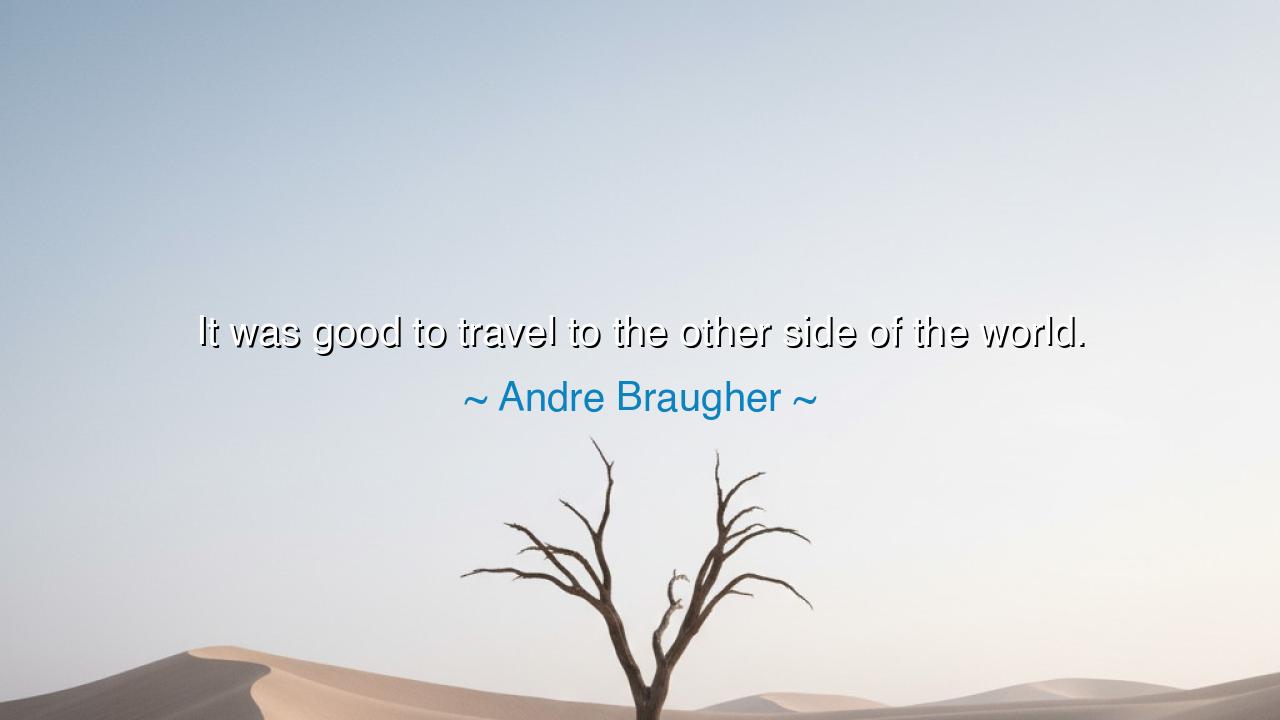
It was good to travel to the other side of the world.






In the words of Andre Braugher, spoken with quiet gravity, we hear both simplicity and depth: “It was good to travel to the other side of the world.” At first, it may seem a plain reflection, the voice of one remarking upon a journey completed. Yet beneath its calm phrasing lies an ancient truth: that to leave one’s own land, to cross oceans and mountains, and to stand upon foreign soil, is to experience renewal of spirit. For the world is wide, and only those who travel beyond the borders of the familiar taste the full measure of its wonder.
To travel is not merely to move the body from one place to another, but to let the soul stretch itself against new horizons. Each journey becomes a mirror, showing us who we are when stripped of the comforts and customs of home. To go to the other side of the world is to embrace strangeness, to dwell for a time among unfamiliar tongues and customs, and in that strangeness, to discover kinship with all humanity. For the heart, though it beats in many lands, speaks the same eternal language.
The ancients knew this well. Think of Herodotus, the father of history, who roamed Egypt, Babylon, and distant lands, gathering stories of gods and kings. His journeys shaped not only his own understanding, but the knowledge of all Greece. Or consider Marco Polo, who crossed deserts and mountains to reach the court of Kublai Khan, and upon returning, expanded the vision of Europe. Each of these travelers bore witness to the truth that stepping onto foreign soil changes not only the traveler, but the world to which he returns.
To say “it was good” is itself an act of wisdom. For not every journey is easy, nor every road pleasant. There are hardships, weariness, and even fear in crossing so far. Yet even these struggles become treasures, for they teach resilience, humility, and gratitude. The “goodness” of travel does not lie in comfort, but in transformation. It is the good of growth, of learning, of seeing life from a broader vantage point than one’s birthplace can ever provide.
In the age of empires, it was often the act of travel that knit together civilizations. The Silk Road carried not only silk and spices, but philosophies, inventions, and faiths. When the Buddhist monk Xuanzang journeyed from China to India, he brought back scriptures that reshaped the spiritual life of his homeland. When sailors of Portugal and Spain crossed into unknown waters, they opened exchanges that changed the course of nations. Travel has always been more than movement—it is the lifeblood of human connection.
Braugher’s words, though simple, echo this heroic tradition. To cross to the other side of the world is not only to see distance, but to conquer inward boundaries: fear, narrowness, ignorance. And when the traveler returns, he carries not only stories, but wisdom, humility, and often gratitude for both the world he saw and the home he left behind. In this way, travel becomes both an outward and inward pilgrimage.
The lesson is clear: seek out journeys that take you beyond your comfort, beyond your borders, beyond your familiar world. Do not shrink from the far side of the earth, whether it is a literal land or a metaphorical challenge. For in such journeys lies the chance to become more fully alive, more fully human.
So I say to you: embrace the spirit of the traveler. Travel to the “other side of the world,” whether in body, in mind, or in spirit. Let the strangeness of the new teach you humility, let the beauty of distant lands enlarge your soul, and return with wisdom to share. For it is always good—indeed, it is one of the greatest goods—to go forth into the unknown, and return transformed.






AAdministratorAdministrator
Welcome, honored guests. Please leave a comment, we will respond soon